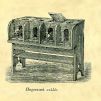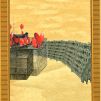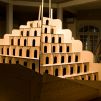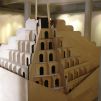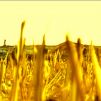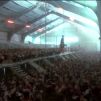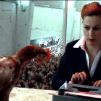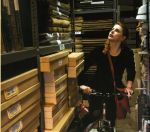CACT E-STUDIO
Mary Zygouri was born in Athens in 1973. She lives and works in Athens.
Body as a political means in Mary Zygouri’s performances
Mary Zygouri, one of the most dynamic, determined and innovative presences in contemporary artistic scene, employs various means always using performance as her fixed point of reference. Her actions, organized in detail and thoroughly prepared, usually unfold in public spaces thus provoking unpredictable outcomes and the viewers’ critical participation; a practice enabling the action to diverge.
The surroundings and the spaces she chooses to perform in vary in form, usage and function; hamam, garden, railway station, circus, monastery, square, poultry farm are some of her options. Places of social intercourse, places of controlled or free passage. Her physical movement in space is so powerful that literally absorbs the human and urban vibrations transforming them into a political act of self-definition through art. She aims to practically overthrow the social conventions that support the reproduction of power mechanisms.
The theoretical core of her performances in the public realm focuses on various kinds of resistance against the powerful processes of subjectivation and subjection. The body stands as a vehicle of cultural recordings, as a means to express a political stance, a field in which restrictions, principles and the normative standards on human functioning, development and behavior are being intertwined and refuted. Historical evidence is the narrative background to several of her works, either in the form of the emergence of marginalized past moments unknown to the public, or by making up believable stories, which are woven through a careful collection of realistic details that shift between historical fiction and creative invention.
Zygouri’s existent or made-up stories raise issues of timely and timeless value. In 2007 she gave one of her most outstanding performances, Symbiosis, in a poultry farm in Torino. The basic concept supporting this work seems schizophrenic: a decent and austere employee is absorbed in striking the keys of her typewriter despite her being amidst the rumble of thousands of poultry wandering around her. Her odd although frantic task takes place in the unfamiliar environment of an indoors poultry farm. A short chronological note helps the viewer to interpret this weird scene; the work refers to an incident of the political life in Argentina: in 1946, Juan Peron after being elected as a leader, relieves Jorge Louis Borges of his duties as a librarian and appoints him inspector of poultry at the Buenos Aires public market in an attempt to suppress Borges’ reaction against the antidemocratic ways in which Peron ruled over the country.
The poultry farm, as an allegory representing the processed methods of manipulating the psychic life, critical thought and political conscience, develops into a new work of art shortly after.
In 2009 Mary Zygouri presents her work entitled Fattening Cells, commissioned by the 2nd Thessaloniki Biennale of Contemporary Art, in Bey Hamam (Paradise Baths), a 15th century ottoman monument. The Fattening Cells consist of the invented historical biography regarding an individual that never existed, the pioneer, nobleman and cosmopolitan Dimitrios Zalouchos, with a supposed innovative activity in poultry breeding, followed by an exemplary structure for poultry fattening, which is completed by the designs documenting the previous research. The fattening cells constitute a visual simulation of the procedures regarding the formation, control, hierarchy and surveillance of the “hatched citizens”, applied by the modern authorities that guarantee docility and obedience through self-recognition. It is an ideal aesthetic model for the technologies of bio-politics, a contemporary utopian paradigm of a Benthamian Panopticon, according to Foucault’s concept, where every cell is a small theatre with only one actor remaining in the center, alone, transparent and completely under control.
The unreasonable futility and the strange attractiveness of these symbolic rituals of power –even in the absence of the subject/viewer– are embodied in the hieratic, female figure that is prominent in the work Decadence (video-performance, 2008, part of the trilogy Zoopoetics –Zoopolitics). Standing on a peculiar, damaged vehicle reminiscent of a makeshift spaceship, she resembles a goddess of a declining religion whose rituals however resisted and she parades in triumph through the meadow saluting imaginary crowds, in an attempt to translate the sensual milieu of auctoritas sexualis into a poetic and political gesture.
